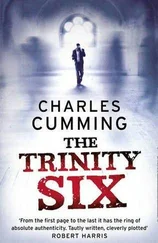“Not better enough. With practice, you could speak it so we’d understand your name clearly, but it would never sound natural. And your name is very simple, no problematic consonant digraphs like ‘st’ or ‘th’ or ‘dl’. Add to that, you want to speak it, what? Slowed down by a third?”
Cindy Elder said, “Gerry’s right. You could work with a speech pathologist for ten years, and you still wouldn’t be able to pull it off. I just don’t think it’s possible.”
Daniel pointed at the computer screen. “Gerry, can you access the Internet on that?”
“Can do, Padre.”
After giving them a quick summary of the Trinity Anomaly, Daniel directed Gerry to the Tim Trinity Word of God Ministries website, to the page where Trinity’s broadcasts were archived as Quicktime movies. Checking his transcript notes, he said, “April twenty-third broadcast, beginning forty-two minutes in, lasting for a minute-thirty. Can you record that?”
Gerry did, and they all watched as Tim Trinity did his tongues routine.
“Audio manipulation?” asked Daniel.
“Must be,” said Cindy Elder.
“Looks smooth too,” said Gerry. “But you can’t fool el waveform monitor .” He flicked the switch on a little round monitor, and the screen glowed green, like an old radar screen. Then he tapped on the computer keyboard, brought the downloaded video to the end of the tongues act. “Speed it by a third, you said?”
“Yeah, he speaks it at two-thirds normal speed.”
Gerry let out a broad smile. “Whoa, dude.”
“What?”
“Two-thirds. That’s 66.6 percent. Number of the Beast.” Then he made a noise like a cartoon ghost. “Oooh, spooky.”
“Gerry, please,” said Cindy Elder.
“Just sayin’, is all,” Gerry shrugged. He tapped the percentage into his computer, spoke to the video image of Trinity on the screen, “Get ready to be busted, Mr. Holy Roller.” He hit the enter key.
Trinity gave the same weather report Daniel had heard in Nick’s office, his inflections sounding completely natural.
Green lines danced around the screen of the waveform monitor, mapping the audio profile of Trinity’s speech patterns. Gerry stared hard at the screen, and his smile disappeared.
“Damn,” he said.
“What do you see, Gerry?” said Cindy Elder.
“That’s the problem. I don’t see anything. Can’t believe it, but I don’t see any evidence that the audio’s been messed with.”
“There must be a mistake,” said the professor. “He just said ‘thunderstorm.’ Impossible to say backward. Would never sound natural.”
“I calibrated the monitors this morning. I’m telling you, this is for real.”
Daniel stood stock-still, feeling like the floor had just been removed from under his feet. Like the dream of falling that jerks you back from the edge of sleep.

Las Vegas, Nevada…
William Lamech sat behind bulletproof glass in the wood and leather lounge of his Bentley limousine, a crocodile-skin briefcase on his lap. Inside the briefcase was something more explosive than dynamite, more dangerous than powdered anthrax.
Inside was something that could take down the entire gambling industry, or at least the sports books. And William Lamech was not going to let that happen, whatever the fuck he had to do. He’d been in the gambling business fifty-three years, had survived the cowboys and mob wars and the F-B-fucking-I, all while quietly building a personal fortune of over one hundred million dollars and earning many times that amount for his employers. He had a talent for turning peril into opportunity, and he thought he’d seen it all. But he’d never seen a threat remotely like the one now sitting in the briefcase on his lap.
Lamech was not your average septuagenarian. At seventy-three, he still swam lengths in the casino pool an hour each morning, did crunches and push-ups in reps of fifty, and worked with weights three days a week. People often said he wore his age like Clint Eastwood. He preferred to think of himself more like Jack Palance, but most people had already forgotten Palance, a mere fifteen years after the great man’s death.
You’re here, you’re gone, and no one remembers. Not a complaint, just a statement of fact. While Lamech intended to stick around as long as he could, he wasn’t afraid of melting into the sands of forgotten history when his time came. In fact, he’d already started melting.
Time was, everyone in Las Vegas knew his name, and the important people in Chicago knew it too. Time was, he was a celebrity in this goddamn town. Feel like a little gambling, Mr. Lamech? A nod of his head, and a tray of checks would appear. Dino would be honored, Mr. Lamech, if you’d drop by his dressing room at the Sands for a drink before the show. And to have William Lamech seen in your restaurant was always worth a complimentary surf-n-turf and a bottle of your finest champagne.
And then Las Vegas changed. Wall Street muscled out Chicago, and now corporate accountants ran the joint. Many of the better restaurants still refused to present Lamech with a bill, but outside the sports books, most of the younger casino workers didn’t know who the hell he was. They knew they should know, knew he was important, and always treated him with respect, but the days of widespread fawning were long past. And that was OK with him. He’d enjoyed the high profile of his middle years, but at a certain age it befits a man to gracefully yield the spotlight. Anyway, he’d never really been in it for the fame; it was always about the money.
And he was still making a pantload of money, from both his legitimate casino operation and from the less legitimate network of backroom bookies he personally bankrolled in over a dozen cities.
The corporate accountants now running Las Vegas didn’t much care for the old-school Chicago guys, but the sports book was the one part of a casino that couldn’t be managed by numbers alone. To maximize profit, you needed a deep and practical understanding of both gambling psychology and the dynamics of group behavior. And you needed a reliable network of informants to let you know when the fix was in, who was hiding an injury, and the sordid personal troubles of various athletes.
Each year more than three billion dollars was wagered in Las Vegas sports books, and the books held onto 4.5 percent of it. If your hold dropped below 4 percent, you found yourself looking for a new career. If it hit 5 percent, you were a superstar. William Lamech’s sports book was one of the largest in town, with more than thirty massive screens on the wall and plush seating with personal monitors at each station. And Lamech’s book averaged a 5.6 percent hold. He was the best there was, and the corporate accountants just had to shut the hell up and kiss his ring. Much had changed in the Nevada desert, but gambling was still gambling and money was still money, and William Lamech had faced all comers for fifty-three years and hadn’t lost a fight yet.
Whoever was behind this strange new threat had miscalculated, Lamech told himself. And whatever leverage they thought they had, it wouldn’t be enough. He was a tough old bastard; if they forced him to prove it, he would prove it.
And woe be to them.

“Well I think it’s bullshit,” said Michael Passarelli. “I don’t believe it for a second.”
“I don’t buy it either,” said Jared Case. “It must’ve been recorded after the game.”
Читать дальше














